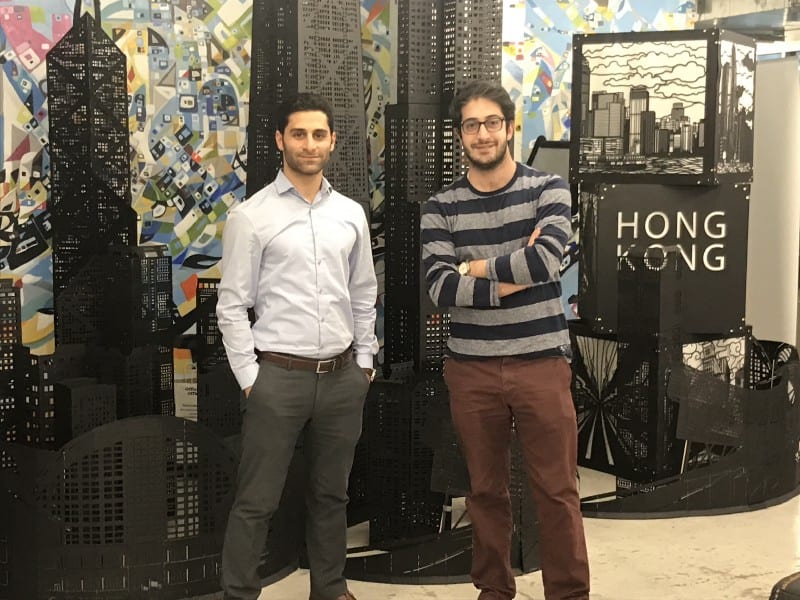
Chicago fue amor a primera vista para Malek Abdulsamad.
Chicago fue amor a primera vista para Malek Abdulsamad. Este arquitecto sirio de 28 años había llegado a la ciudad después de que un amigo de la infancia de Damasco le insistiera para que la visitara.
"Anwar no paraba de hablar de Chicago", bromea Abdulsamad sobre su amigo Anwar Jebran, que estuvo aquí estudiando para sus exámenes de la junta médica. "La verdad es que no me interesaba conocer Chicago, pero luego vine de visita y todo cambió".
Malek decidió trasladarse a Chicago para estudiar un máster en urbanismo, dejando atrás la creciente violencia en su país natal. Y mientras los dos amigos estrechaban lazos por su infancia en Siria y su amor por la Ciudad de los Vientos, encontraron la forma de vincular sus dos pasiones. Chicago en árabe nació.
Los amigos diseñaron el popular sitio web de eventos de la ciudad en árabe para ayudar a los recién llegados de habla árabe y a los visitantes internacionales a mantenerse al día sobre la ciudad. Con más de 300.000 lectores, Jebran y Abdulsamad están orgullosos de ayudar a los habitantes de Oriente Medio a amar su nueva ciudad tanto como ellos.
Borderless se sentó con Jebran y Abdulsamad para hablar de Chicago en árabe y las similitudes entre Damasco -la Ciudad del Jazmín- y la Ciudad de los Hombros Anchos.
Sin fronteras: Háblenos de la inspiración para Chicago en árabe.
Abdulsamad: La idea se nos ocurrió hace un año y medio. No dejábamos de preguntarnos por qué no hay una fuente local de noticias en árabe, a pesar de la enorme comunidad de arabófonos de la ciudad y los suburbios circundantes. Anwar y yo hablamos de ello durante un tiempo y decidimos hacerlo. Primero lanzamos el concepto con una página de Facebook del mismo nombre. Unos meses más tarde, después de recibir mucha atención, pensamos en pasar al siguiente nivel. Invertimos mucho tiempo y energía en el proyecto y lanzamos el sitio web en agosto de 2016.
Jebran: Nos apasiona esta idea, pero inicialmente buscábamos en Internet una guía que ya estuviera haciendo lo que Chicago en árabe es hoy. No encontrábamos ninguna. Nuestras propias familias fueron nuestra mayor inspiración para este concepto. Para ser sinceros, mi madre y mi abuela, cuyo inglés no es perfecto, y sus padres también. Empezamos porque queríamos que nuestros padres estuvieran más comprometidos con la ciudad.
Sin fronteras: ¿De dónde procede la mayor parte del contenido?
Jebran: Hay muchas fuentes. Nos encanta la web Chicago Parks, pero también plataformas como Meetup.com. Sitios de noticias locales como el Chicago Reader y DNAinfo que leemos para inspirarnos. También buscamos colaboradores, como periodistas, fotógrafos y videógrafos, que puedan crear contenidos únicos para nuestro sitio.
Sin fronteras: ¿Qué tipo de barrera supone el idioma cuando se llega a Chicago como inmigrante o refugiado de habla árabe?
Abdulsamad: Cuando llegas a Chicago con un nivel de inglés medio, o incluso inexistente, esta barrera lingüística puede impedirte integrarte simplemente porque al principio no eres capaz de entablar relaciones con personas que no hablan árabe, o no puedes leer contenidos en línea para saber realmente qué está pasando. Chicago en árabe ayuda a nuestros lectores a encontrar contenidos que les harán enamorarse de Chicago y, con suerte, encontrar algunos eventos o atracciones a los que unirse.
Personalmente, estudié un posgrado en Chicago y no tenía ningún arabófono en mi círculo de amigos. Tenía 20 o 30 amigos estadounidenses en la facultad, y era genial. Mis amigos arabófonos siempre me preguntaban: "¿Cómo te has enterado de este campamento?", o de esto, o de lo otro. Yo siempre pensaba: "Todos mis amigos estadounidenses lo sabían, ¿cómo es que tú no te enteraste?". Esta experiencia me hizo darme cuenta de que, a menos que te hagas amigo de la comunidad de Chicago o hables el idioma, es difícil enterarse de lo que pasa. Hay una especie de barrera que te separa de la ciudad.
Jebran: Creemos que el idioma no debe impedirle conocer nuestra ciudad ni disfrutar de todos los actos sociales que aquí se celebran. Muchos inmigrantes y refugiados árabes recientes se sienten más cómodos leyendo en árabe, por lo que nuestro sitio les ayuda a conocer mejor los acontecimientos locales en su lengua materna. Estamos muy orgullosos de ser el vínculo entre estas dos comunidades.
Sin fronteras: El proyecto trata de tender puentes entre la comunidad arabófona y la comunidad en general de Chicago. ¿Por qué es importante?
Abdulsamad: Me encanta Chicago y todo lo que pasa aquí. Para mí, es una gran oportunidad perdida para alguien vivir en una ciudad tan increíble en la que pasan tantas cosas y no vivirla de verdad, ¿sabes? Algunas de las cosas que más echamos de menos de Damasco fueron los eventos, pero para ser sincero, allí no pasaban tantas cosas como aquí en Chicago. Llegas aquí y hay tantas cosas que hacer. Es un fastidio pensar que los arabohablantes pueden mudarse a Chicago y no aprovechar esa oportunidad por la barrera del idioma.
Jebran: Queremos que nuestra comunidad esté más comprometida con la ciudad, creando a su vez una mayor variedad en nuestro nuevo hogar. Cuanto más diversa es la ciudad, más poderosa es. Por eso les damos información sobre todos los nuevos negocios, las nuevas startups, e incluso hemos elaborado una guía sobre barrios en la que hablamos de cada barrio de Chicago, con restaurantes y lugares emblemáticos. Queremos que participen más en la ciudad y que no se queden aislados. El aislamiento nunca es bueno.
Sin fronteras: ¿Qué tendencias de contenido ha observado entre sus lectores?
Abdulsamad: El tiempo Si hablamos de clima extremo todo se vuelve viral. Quieren etiquetar a todos sus primos en Siria y presumir de ello.
Jebran: A nuestros lectores también les gustan las actividades para niños y los eventos familiares. La comida también es un tema importante, como nuevos restaurantes o cafeterías. Yo diría que los principales destinos de la ciudad o la historia de Chicago son también muy populares entre nuestros lectores. Pero nunca hablamos de política o religión.
Sin fronteras: ¿Por qué ni política ni religión?
Jebran: El gran objetivo es unir a toda la comunidad arabófona con la gran comunidad de Chicago. Incluso dentro de la comunidad arabófona queremos más unidad. La religión y la política siempre dividen. Con nuestra propia experiencia en Siria, conocemos personalmente a gente que eran muy buenos amigos antes de 2011 y ahora, de repente, están peleados por culpa de la política. En cambio, en Chicago en árabe se habla de historia, de cultura o simplemente de disfrutar de la ciudad y de la humanidad: las cosas que unen, no las que dividen.
Abdulsamad: Una cosa que nos reafirmó en que esto era lo correcto fue la investigación de otros grupos árabe-céntricos en Facebook. Observamos qué causaba conflictos en estos grupos y la mayoría de las veces eran mensajes políticos sobre religión. Dijimos: "Está claro que este no es el camino. No hace más que enfadar a la gente, y no es lo que buscamos con Chicago en árabe.

Sin fronteras: ¿Qué ha encontrado en Chicago que le recuerde a Damasco?
Abdulsamad: Chicago es muy diferente de Damasco. Damasco es muy antiguo. Mientras que Chicago acaba de cumplir 183 años, Damasco cumple 5000. En términos de edad o historia, son incomparables, pero la vitalidad de las calles me recuerda un poco a Damasco. Cuando uno pasea por las calles de aquí se parece a Damasco: llenas de gente, vida y comercio. Chicago, como Damasco, no es una ciudad de estilo suburbano. Ir andando al trabajo y utilizar el transporte público son pequeños recuerdos de la vida en Damasco.
Sin fronteras: ¿Qué es lo que más le gusta de vivir en Chicago?
Jebran: Los parques son siempre uno de los favoritos. Me sorprende la cantidad de parques que hay. Eso es algo de lo que carece Damasco. Siempre me sorprende lo verde que es Chicago.
Abdulsamad: Para mí es la historia de Chicago. Conoces esa sensación cuando has aprendido algo y estás deseando compartirlo. Eso es lo que siento por Chicago. Siempre que paseo con amigos o familiares, les digo: "¿Sabías que este edificio estaba aquí en este año?" o "Cuando esto estaba aquí, todo este lugar no existía". Empiezas a contar historias sobre este lugar y te hace sentir que perteneces a él.
Más información Chicago en árabe en línea en ChicagoEnArabe.com.
